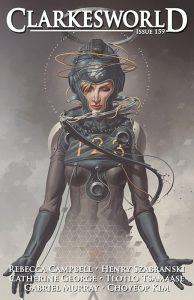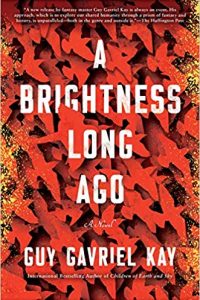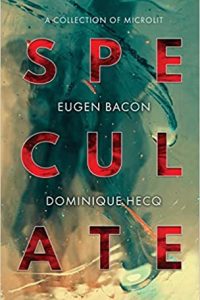Karen Burnham Reviews Short Fiction: Clarkesworld, Tor.com, and Mithila Review
 Clarkesworld 12/19
Clarkesworld 12/19
Tor.com 11/6/19, 11/13/19, 12/4/19, 12/11/19
Mithila Review 12/19
In this month’s column I finally bid adieu to 2019 for good. As always, I wish I could have read more, but there were plenty of strong stories to leave me feeling good about the year and optimistic for the one ahead.
My favorite story in December’s Clarkesworld was “Annotated Setlist of the Mikaela Cole Jazz Quintet” by Catherine George. It is exactly what the title implies – there’s a jazz quintet that forms, led by Mikaela, and the story consists of notes on the songs they play. However, the quintet plays on a generation starship, and it turns out that their original mission didn’t go as planned. This story syncs a list-style structure with character portraits and worldbuilding in a particularly smooth and masterful way, with a great balance between hopefulness and melancholy. In “Such Thoughts are Unproductive” by Rebecca Campbell, our nascent no-privacy reality is ramped up to 11. The narrator is interacting with an online entity she (mostly) believes to be her mother, who was taken to some kind of reeducation camp. Even though she’s allowed video phone calls now, she can’t be sure if she’s talking to a person or a digital reconstruction. And what about the “aunt” who claims to be a friend of her mother’s checking in on her in real life? This is a classic story of navigating a dystopia three minutes into the future.
Gabriel Murray gives us “Appointment in Vienna“, which is beautifully written. It consists of notes to an editor; a photographer imagining a career retrospective volume and musing on the back story of many of the photographs to be contained within. What unfolds from this often arch commentary is a supernatural spy thriller set in WWII and the early Cold War era. The issue ends with “Symbiosis Theory” by Choyeop Kim (translated by Joung-min Lee Comfort). It imagines a brilliant artist who consistently produces art from an alien planet and claims that she is only reproducing what she sees. After her death, some researchers are working at interpreting infant cognition directly into speech, the better to help parents interpret late-night cries. What they find instead is an on-going conversation between seemingly multiple sophisticated entities inside each baby’s brain, patterns that fade away as the child ages. This story lets an idea unfold without much concern for character, and it lines up its evidence very neatly to support a perfectly out-there science fictional premise.
Tor.com starts November with a story that only Lavie Tidhar could produce. In “In Xanadu” Nila is a soldier protecting a digital entity in the far reaches of the solar system, and she is bored. We get a whirlwind tour of the worldbuilding that brought her to this circumstance, and then her next routine surface patrol quickly ceases to be routine. In the chaos that follows, she is attacked by a panther-like drone entity and encounters an ancient robot who ironically spouts Asimov’s laws while helping her, and which seems to be advancing its own mysterious mission as well. This definitely plays to Tidhar’s strengths. “The Touches” by Brenda Peynado plays in the nearer future where the surface of Earth has been swept by so many rapidly mutating pandemics that the human survivors are all living in strict quarantine and are tended to by sterile robots, which are starting to get glitchy. Salipa and Tero are expecting a child, so Salipa is pregnant in the “clean” VR world where they live most of their lives, but not in the “dirty” world of sterile rooms where they have to eat and excrete. At the beginning of the story, we learn that she has only experienced real human touch four times in her life, and through this story we learn about all of them, especially as an incident in the “dirty” world goes horribly wrong. The worldbuilding here didn’t strike me as plausible, but the character portrait in the circumstances is well done.
E. Lily Yu brings us “The Time Invariance of Snow” in which she blends Hans Christian Anderson’s Snow Queen story, as the Devil’s mirror shatters and the shards lodge in people’s souls, with physics, plus gender and power dynamics. This is a dense and allusive story that will reward re-reading. Garth Nix‘s “Dislocation Space” is a historical SF story set in the USSR and relating to the site of the Fortean-favorite Tunguska event. Aleksandra is a political prisoner in Siberia – an ex-sniper, ex-assassin, and ex-acrobat extraordinaire. Using her family as leverage, the Soviet leaders march her out of prison to make her help investigate some sort of alien passageway. As they put her through rehearsals to ensure that she’ll be successful, she’s able to get information from her former mentor, which will let her take control of her own fate. A lot of the story deals with navigating the tortuous psychological pathways that are constrained by the post-truth Orwellian Soviet state, and of course Aleksandra’s own quasi-superpowers as a supremely flexible, trained, and determined agent of her own destiny. This is a story that I did not want to put down.
Mithila Review continues its efforts to publish speculative fiction from around the world. The stories range from punchy to meditative, with everything in between. “Upshot” by Drema Deóraich imagines a woman who kills people coming to poach the local Quetzals. This also helps her provide for her children after her husband was killed during a time of strife. She’s starting to get sick with something that’s not a normal infection. This is a character portrait of a woman doing what she can to survive and worried that it’s not enough. “The Ghost Teas of Sakurajima” by Deborah L. Davitt focuses on a samurai who carries out assassinations for his lord. He’s good enough at his job that he was awarded a minor noble wife, and although the match was arranged he came to truly love her. Now he’s haunted after her strangely premature death – literally haunted by her ghost, who is obviously trying to communicate something that he can’t quite grasp. While he has to make a physical journey to resolve the mystery, the story is really a psychological journey on the way to his acceptance of something completely outside his worldview. By contrast “Flower Arranging at the End of the Japanese Empire” by Dean A. Brink is an alternate history. Here Japan successfully occupied the West Coast of the United States during WWII. We don’t get much in the way of historical detail, as the story focuses on the narrator, a white resident who tries desperately to win the approval of their sensei by trying to master flower arranging. They’re trying to overcome a lot of racism, but the strength of that cultural sense of superiority seems to wax and wane with the political fortunes of the empire. There’s an extra science fictional twist as people try to use genetic therapy to become “more Japanese” in an almost indefinable sense, and the story shows, what consequences that might bring as the Empire begins to recede. “Sonya, Josephine, and the Tragic Re-Invention of the Telephone” by I.S. Heynen is fascinating. It’s set in a city that, after complete societal collapse, has walled itself off from the outside world. It has so little central authority that it has itself collapsed into a moderately functioning anarchy where assassination is perfectly legal. Sonya is a corporate recruiter working to match assassins with the clients who need their services, and, unfortunately, she overpromised a job to one of the best, Josephine, who is extremely not happy at Sonya’s attempts to delay. Sonya’s life is immediately in jeopardy, notwithstanding the anonymity she’s supposed to have. She recruits her boyfriend (also an assassin) and officemates to help, but violence inevitably ensues. Amazingly, her boyfriend’s help continues after his death, but there are no guarantees. This is a fun working-class thriller, and if there are some plot holes here and there the momentum is more than enough to carry you past them.
Mysterion is a new-to-me venue, publishing regularly since 2018, focusing on Christian-themed speculative fiction. Its Nov/Dec issue opens with a strong piece of historical fantasy, “Fools Pass Under” by Kat Otis. It’s London in 1633, and the troll has woken up under London Bridge and is demanding human sacrifices to eat before going back to sleep. Senior Bridgemaister John Potter is the man on the scene who has to coordinate between the government and the populace, and, knowing the history of trolls and how these encounters play out, has to organize the offering of sacrifices. He approaches his job with as much humanity as possible, and in a denouement that I particularly appreciated, does not escape from the day without a profound stain on his psyche.
Recommended Stories
“Annotated Setlist of the Mikaela Cole Jazz Quintet”, Catherine George (Clarkesworld 12/19)
“Dislocation Space”, Garth Nix (Tor.com 12/11/19)
Karen Burnham is an electromagnetics engineer by way of vocation, and a book reviewer/critic by way of avocation. She has worked on NASA projects including the Dream Chaser spacecraft and currently works in the automotive industry in Michigan. She has reviewed for venues such as Locus Magazine, NYRSF, Strange Horizons, SFSignal.com, and Cascadia Subduction Zone. She has produced podcasts for Locusmag.com and SFSignal.com, especially SF Crossing the Gulf with Karen Lord. Her book on Greg Egan came out from University of Illinois Press in 2014, and she has twice been nominated in the Best Non Fiction category of the British SF Awards.
This review and more like it in the February 2020 issue of Locus.
 While you are here, please take a moment to support Locus with a one-time or recurring donation. We rely on reader donations to keep the magazine and site going, and would like to keep the site paywall free, but WE NEED YOUR FINANCIAL SUPPORT to continue quality coverage of the science fiction and fantasy field.
While you are here, please take a moment to support Locus with a one-time or recurring donation. We rely on reader donations to keep the magazine and site going, and would like to keep the site paywall free, but WE NEED YOUR FINANCIAL SUPPORT to continue quality coverage of the science fiction and fantasy field.







